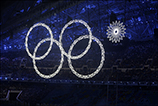Who had time for the Olympics?

Disclaimer: The opinions expressed in these articles do not necessarily represent those of Maryville College or the Highland Echo staff.
Today, people are more connected to what’s going on in the world than we ever have been before. I can pull out my phone and FaceTime my friend in Florida, then I can check how well my IBM stock is doing right this minute.
Just kidding, I’m not mature enough to have stock in IBM yet. My stock’s in LEGO.
But thanks to technology we now know as soon as our teachers do when school is closed, because we get an email, phone call and text alerts all within the span of a minute.
Then I can tweet about it (#snowday #sledding #dresswarm), because this is the information age.
In this current era of news at our fingertips, I was interested to see how we would adapt to a classic event like the Olympics being held on the other side of the world when we can find out what’s happening instantly on the Internet.
Surely, this being the 22nd Olympic Winter Games, the event would operate like a well-oiled machine.
But, then again, Russia was hosting.
Before the opening ceremonies, the headlines for Sochi had practically already been written: How would Russia treat homosexuals? Were all countries still going to be participate? Would the athletes survive the Olympic Village? And who in their right mind thought a beachside city on the southern point of Russia should host the Winter Olympics?
For the most part, NBC did a great job of broadcasting the event. They focused on the hard work it took to get to Sochi by doing plenty of features that told the athletes’ respective stories.
During the day, they aired team events and others that were too “boring” to reserve for primetime, and primetime featured the popular events, as well as figure skating.
I applaud NBC for allowing the Sochi games to create their own headlines, like the Dutch dominance in speed skating, the return of Jamaica Bobsledding, the best dressed individuals at the ceremonies and Bob Costas’ pink eye(s).
NBC also tried to adapt to all the latest technology in covering the events.
Unfortunately, this is where the problems with Sochi arise. Maryville is nine hours behind Sochi, so a lot of the live events happened early in the day.
Live streaming was available for all events from NBC’s website and phone app, which meant I could still watch the men’s hockey games from class (sorry about that again, professors).
Despite this technology, as an audience, we were at the mercy of our own ignorance to the broadcast delay, our daytime plans and NBC’s preferences in events. It was hard to know exactly when to tune in to watch my favorite skiing events like long jump and half pipe.
But what this also meant was the results of pre-recorded events aired in primetime were readily available on the Internet.
When big news happened, like when Shaun White failed to medal, everyone connected to social media knew about it well before it made it to primetime.
At that point, whether Americans figured out the broadcast was taped, or because our golden boy crashed out in snowboarding’s biggest event, it seemed the excitement of the games fizzled out. The rest of the games lost their aura, at least for me.
Furthermore, NBC exclusively held the rights to the footage, so the U.S.’s number one sports resource, ESPN, didn’t get to promote many events and couldn’t show highlights.The other main stations didn’t promote the Olympics, either. Instead, they only reacted to Sochi’s events.
Altogether, the Sochi Olympics wasn’t as much of a national event as Winter Olympics prior have been.
The whole country was seldom buzzing over an incredible individual performance, due in part to the fact that the big names failed to produce. Shaun White, Shoni Davis, Lindsey Vonn, Bode Miller and U.S. Hockey all left empty handed.
We saw the possibilities of how the U.S. can unite around a performance when our hockey team beat Russia in overtime and T.J. Oshie cemented his place in American lore.
However, that was a blessing more than a miracle since the U.S.A. was heartbroken by Canada three games later and destroyed by Finland in the bronze medal game.
Again, because of this, Sochi will be remembered by the viral images of the Olympic rings in the opening ceremony and Bob Costas’ eye.
But in today’s world, all of that is old news, anyway. I’ve got “House of Cards” to watch.

